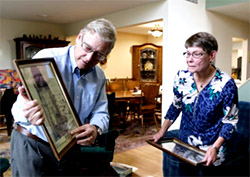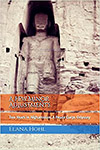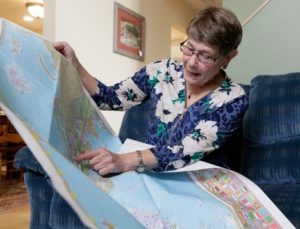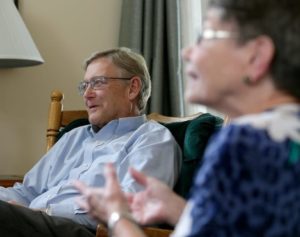Afghanistan 50 years ago
Described in autobiographical book by Peace Corps Volunteer Elana Hohl (Afghasnistan 1971-73)
Holly Zachariah
The Columbus Dispatch

Michael & Elana reminisce about their travels
There they were, two 21-year-old newlyweds and recent college graduates from the Midwest, staring out the windows as the chartered plane that carried them and 75 other Peace Corps volunteers into Afghanistan approached the airstrip of Kabul International Airport.
The vast and barren land that Elana and Michael Hohl had been studying for hours from the sky suddenly gave way to a city below, and camels and donkeys came into clear view. As the plane bounced down onto the runway on that steaming July day in 1971, there wasn’t an ounce of trepidation in either of the Hohls’ hearts or minds.
“We were excited,” Michael recalled recently as he and his wife of 51 years sat in the living room of their condominium in the Northland neighborhood, a cozy home where nearly every space is decorated with treasures from their decades of service teaching English as a second language around the world.
 “We were idealistic in those days, children of the ’60s, right?” Michael said. “We had long known we were being called to make a difference.”
“We were idealistic in those days, children of the ’60s, right?” Michael said. “We had long known we were being called to make a difference.”
But Afghanistan? In 1971?
This couple had never even heard of the country before. Michael had been raised in the North Linden area, the oldest of 16 kids who had never been on a plane before this journey. And Elana, the oldest of 8, had grown up in southern Indiana.
When they decided on the Peace Corps even before they married as seniors at Marian College in Indianapolis, they figured they would be headed to South America, Africa or the South Seas. But the organization had other plans.
 In her recently self-published book about the couple’s Afghanistan journey, “A Few Minor Adjustments,” Elana writes about the moment the Peace Corps called to say they’d been accepted and given an assignment.
In her recently self-published book about the couple’s Afghanistan journey, “A Few Minor Adjustments,” Elana writes about the moment the Peace Corps called to say they’d been accepted and given an assignment.
“We hung up the phone and just stared at one another,” she wrote. “Our first reaction after hanging up the receiver was to grab an atlas and find out where in the world we had volunteered to commit the first two years of our married lives.”
But once the odyssey began, neither ever looked back with a regret.
What’s happening now with Taliban rule in Afghanistan ‘breaks my heart’
The nearly 600-page book about the couple’s time in Afghanistan — constructed both from memory and from all the letters sent home to friends and family back then — started out more than 40 years ago as a way to preserve their memories for their now five grown children and 10 grandchildren.
But when Elana published it this year, Afghanistan was suddenly once again the top story in every newscast, and the faraway country — especially its most-vulnerable women and children — was forefront on everyone’s mind as U.S. troops withdrew after 20 years of war.
The Taliban immediately regained control, calling into focus once again the oppression and danger that women and girls live in under that regime.
And the Hohls, now both 72, found their minds immediately drifting back to the women of Afghanistan whom they witnessed being treated so poorly as they were refused access to education and basic human rights.
The couple felt the timing of the publication of the book, which is available on Amazon, was not an accident, and decided to share their memories and knowledge of the country to better help others understand.
That’s why all the profits from the book (and any donations that come in beyond that) will be go to organizations that support women and girls in Afghanistan. These include the School of Leadership, Afghanistan; Awaken; and the Indiana Center for Middle East Peace.
To know how the country — which had made progress over the years — has quickly regressed in how females are viewed and treated is tough to take, Elana said.
“It breaks my heart,” she said.
Even 50 years after she and her husband were there, she remembers all too well what it was like to be a woman teaching English to boys and men in the country and to be a woman just walking the streets of the villages and cities.
“My husband, as a peacenik, had to be always be in a position of defending me, with men throwing rocks at me, throwing manure at me,” she recalled. “It wasn’t at me personally, though, it is the culture.”
As she taught over the two years spent there, Elana felt strongly that she was making a difference in the mindset of the boys and men she was around.
“My boys — that’s what we called them, ‘Elana’s boys’ — I’d like to think we helped to change their minds about women,” she said. “I’d like to think we changed the trajectory of their lives.”
Elana and Michael devoted a lifetime to service around the world
 The couple’s work was far from over after their return from Afghanistan. Over the years, they taught English in Iran, Saudi Arabia and China and traveled extensively to learn, teach and explore. Elana went on to start and oversee the English-as-a-second-language program at Dublin City Schools.
The couple’s work was far from over after their return from Afghanistan. Over the years, they taught English in Iran, Saudi Arabia and China and traveled extensively to learn, teach and explore. Elana went on to start and oversee the English-as-a-second-language program at Dublin City Schools.
In 2004, Ohio State University started a program to teach English at Wuhan University in China, and professor Bob Eckhart was the first to go. He took Elana with him, and over the next decade, Elana and Michael went with Eckhart two more times.
“I have made it a real point throughout my life to not let go of people like them,” said Eckhart, a 52-year-old who lives in the University District and who has made traveling the world and teaching his life’s passion and work. “Mike and Elana are so special. They’re really great models for me.
“What they have managed to accomplish, what they have managed to do is just staggering and inspirational. They’ve always understood that we live in a bubble and the only way to break out of it is to see the world not as tourists but as both educators and learners.”
Afghan refugees: The toll on Afghan refugees in central Ohio is great
 Now that Elana and Michael are retired — of their five children, two also joined the Peace Corps and one joined the military and served in Afghanistan — they feel so at home settled in Columbus’ most-diverse neighborhood of Northland.
Now that Elana and Michael are retired — of their five children, two also joined the Peace Corps and one joined the military and served in Afghanistan — they feel so at home settled in Columbus’ most-diverse neighborhood of Northland.
“I feel like we’ve finally become the city I always wanted us to be,” Michael said.
Elana agreed.
“Until we learn to know each other, until we learn to love each other, we are not going to have a peaceful world,” she said.
“We have to have a sensitivity to what a culture is about – not just on the outside like it’s music and its food and its dress, but a sensitivity and an understanding at all that is at the roots of its beliefs. I hope the book offers a better understanding of the people of Afghanistan, and motivates people to want to help the women and girls there.”
Mike and Elana, your lives are your moral legacy. And what a legacy it is! Thank you.
Patricia Taylor Edmisten Peru, 1962-64
Elana and Michael,
Thank you so much for writing about Afghani culture before the decades of Western imposed warfare warped everything. I cannot wait to read your Peace Corps experience inspired book.
Also, my wife, our daughter and I would love to go out to dinner with the two of you in Northland one day during a visit to Columbus. We have been to a few ethnic restaurants in Northland and enjoy trying new foods.
Our daughter is attending The Moritz Law School at OSU so we visit from time to time.
Peace and Love.
Andrew Herman
TEFL Gabon 1993-1995
Mike and Elana –
my email address is andrew.herman@howlandschools.org